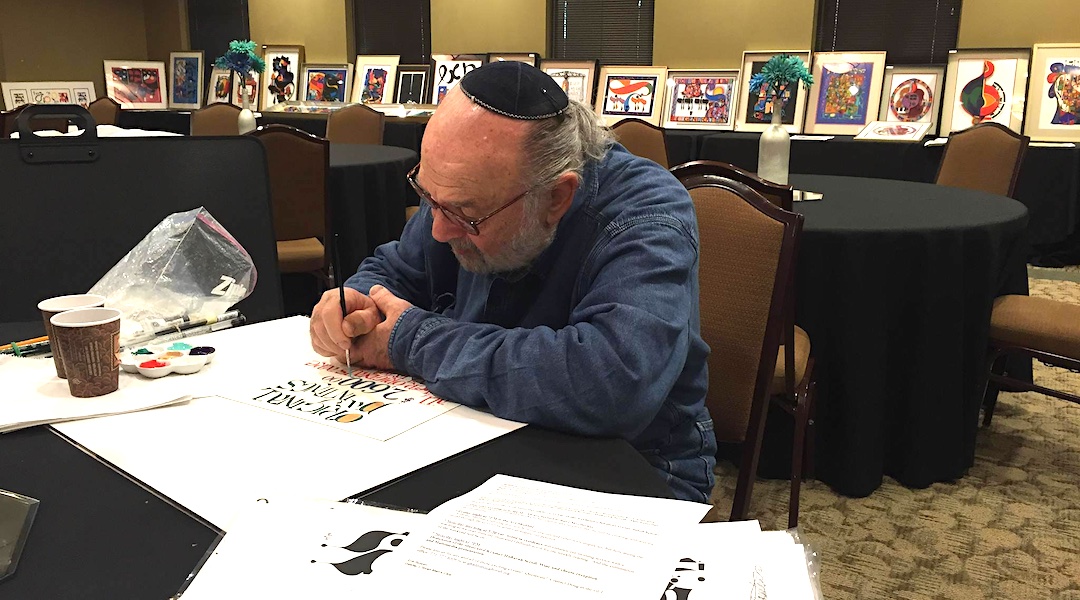Mordechai Rosenstein, calligrapher whose art illuminates Jewish homes and synagogues, dies at 90
“The big thing is that they’re happy,” an associate said of the artist’s works based on Hebrew text

Mordechai Rosenstein, seen in 2014 at a sale of his works, combined bright colors and stylized Hebrew letters for pieces that hang in countless homes, offices and synagogues. (Courtesy Rosenstein Arts, via Facebook)
(JTA) — Mordechai Rosenstein, a painter and calligrapher whose brightly colored illuminations of Hebrew texts adorn countless Jewish homes, offices and synagogues, died on July 9 in Elkins Park, Pennsylvania. He was 90.
His signature pieces featured Hebrew letters that he stretched and manipulated, with bright swaths of colors weaving in and out of the ensuing shapes — a vibrant combination of ‘60s pop art and the illuminated Hebrew manuscripts of the Middle Ages.
Synagogues and Jewish organizations often present Rosenstein prints to honorees, with text appropriate to their service or occupations. One of his best-known pieces, based on the Biblical phrase “Justice, justice, you shall pursue” (Deuteronomy 16:20), is a frequent gift for Jewish lawyers and judges.
His art “has a modern way of looking at the Torah and a modern way of looking at the Hebrew alphabet because his pieces are not black and white people praying at the Wall,” his business partner Barry Magen, who died last year, told the Philadelphia Jewish Exponent in 2022. “It’s very bright and creative, full of color and full of life, and, really, the big thing is that they’re happy.”
In workshops and classes, Rosenstein would frequently tell audiences that all Hebrew calligraphy derives from the tiny letter “Yud” — often used as an abbreviation for the name of God — whose teardrop shape is replicated in the brushstrokes for nearly all Hebrew letters.
Rosenstein was born March 26, 1934, and raised in the Strawberry Mansion neighborhood of Philadelphia to an American-born mother and Russian immigrant father. He attended Akiba Hebrew Academy, a Jewish day school now called the Jack M. Barrack Hebrew Academy. There he began creating a Purim Megillah, using a self-taught method that hinted at what would become his signature style.
“As far as I knew, there was no scribe in Philadelphia, no sofer,” he told the Exponent, using the Hebrew word for a calligrapher. “And there were no books from Israel showing all the typefaces.”
Rosenstein’s mother supported him in his artistic ambitions, buying him art supplies. He attended the Philadelphia Museum of Art and served a two-year stint in the U.S. Army, drawing training aids for weapons and equipment. After his service, he moved to New York City, where he worked as a stylist in the textile industry.
For his own wedding to Mati Kaufman, he created a ketubah, or illuminated wedding contract, and soon did the same for other Jewish couples.
In 1967, Rosenstein returned to Philadelphia to work as the foreman at an uncle’s frame factory, where he continued until the business was sold a decade later. Rosenstein struggled as the owner of his own frame shop in Northeast Philadelphia but caught a lucky break in the early 1970s when an art consultant for Gratz College, Rita Poley, offered to show his work.
“Over the next few years I took advantage of every opportunity I could to publicly present Mordechai’s work,” Poley recalled in 2017.
In 1979 Rosenstein met Saul Zalesne, a salesman with a love for Judaism and art. Zalesne suggested duplicating some of his original works. They named their business EMES Editions (after their first initials and the Hebrew word for truth). Their partnership spanned 35 years. Zalesne died in 2023.
Rosenstein would go on to create over 700 original pieces and with Zalesne’s help sell thousands more reproductions. In his workshops, he would often collaborate with community members to create art pieces for their synagogues.
In a eulogy delivered at his funeral on July 10, his daughter Lisa Rosenstein spoke about his popularity as a Judaica artist. “Partly joking, I say that you are in more synagogues than God,” she said, addressing her late father. “Everyone thinks they know you because your art lives in their homes with them every day.”
Another of his most popular pieces was a depiction of a physician’s oath attributed to Maimonides, which includes a stylized portrait of the medieval sage hugged by Hebrew and English text. The inscription could also be seen a fitting maxim for the calligrapher: “Inspire me with love for my art and for thy creatures.”
His survivors include his wife Mati; a son, Judah Rosenstein; his daughter Lisa (Beth Styles) and two grandchildren, Ava Pearlman and Caleb Rosenstein.















